Editor’s note: Support is available for anyone affected by hate and the current unrest in the Middle East. People can refer to the mental health resources provided by Oregon Health & Science University, or call or text the 24/7 Disaster Distress Helpline 1-800-985-5990 provided by the Substance Abuse and Mental Health Services Administration (SAMHSA).
Protests against the war in Gaza have disrupted many college campuses across the country in recent weeks. Oregon is no exception.
One of the most notable events was the multi-day occupation of Portland State University’s Branford Price Millar Library that began on Monday. Many of the student and community activists were forced out of the library Thursday as police cleared the building. As of Friday, at least 30 activists had been arrested.
The university has agreed to temporarily pause its connections with Boeing as a result of the protests. Though classes have resumed, tensions throughout the campus community still linger.
These protesters — near and far — are largely demonstrating for an end to the war in Gaza.
Related: Students walk out, demand action on Gaza from Portland Public Schools
Like other movements in U.S. history, college students have been at the heart of these actions. Campus protesters have been calling in recent months for their universities to sever ties and divest money connected to Israel’s military efforts in the region.
Decades of history contributed to current events, but the ongoing war started after Hamas, the militant group that governs parts of the Palestinian territory, attacked Israel in an act of terror on Oct. 7.
The assault killed more than 1,200 Israelis and led to about 240 people being taken hostage, some of whom have yet to be released. Graphic reports of sexual violence from the attack have been shared since, and more Jews were killed that day than on any single day since the Holocaust.
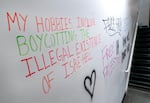
A tour inside the occupied Branford Price Millar Library at Portland State University, April 30, 2024. Demonstrators protesting the war in Gaza have occupied the library since Monday evening.
Kristyna Wentz-Graff / OPB
Since October, Israel has responded with sustained military force, killing more than 30,000 Palestinians and displacing roughly 2 million people in Gaza. Residents are facing evacuation orders and catastrophic levels of hunger. Aid workers and journalists have also been killed in the violence. The result of these atrocities has led to what the Associated Press has reported to be the “deadliest round of Israeli-Palestinian fighting in decades.” Many Americans are pushing back on President Joe Biden’s continued aid to Israel.
Some Oregonians have family in those regions. Some have lost loved ones. Some are feeling torn and conflicted in new ways as the war in Gaza changes political dynamics in the Middle East and the U.S.
OPB spoke with a handful of people in Oregon’s Jewish communities to hear how they are feeling in the midst of the ongoing protests.
Nearly every person stressed that, like any group, Jewish people are not a monolith — not every Jewish person has the same opinion.
Many said they’ve experienced increased harassment, hate speech and feelings of isolation since Oct. 7 and during the protests this week. Some have taken steps to conceal their identities or have physically hidden in their homes.
Others, such as a Jewish protester at PSU this week who gave his name as Nestor, have joined in vocal support of Palestine and a cease-fire.
Nestor said: “I’d rather live in a city where people react to injustice than one where people sit and try to pretend it does not exist.”
Related: Before the Portland State sweep: Dancing, donations and a growing sense of worry
A lack of grey area
Natan Meir, a professor of Judaic studies, has been at PSU for almost 16 years. He’s part of a campus-wide task force created by President Ann Cudd a few months ago to promote dialogue and deal with issues of antisemitism, Islamophobia and anti-Arab bias.
He was at the rally Monday afternoon and agreed with news reports at the time that it was peaceful. But he argued there was also a normalization of anti-Israel hate and antisemitism that he’s seen ramp up at PSU since Oct. 7.
“I’m sad to put it that way, but that’s the way I see it,” Meir said. “That was the rally where people called for the end of Israel, for the end to the Zionist occupation between the Jordan River and the Mediterranean Sea, and where one of the speakers denied that atrocities had taken place during the Oct. 7 massacre.”
Meir said people over the past several months have torn down flyers for courses in Judaic studies and especially Israel-related courses, as well as flyers for events they hosted that had the word Israel in the title.
Meir said he hasn’t experienced any antisemitism directly. He has become more self-conscious about wearing his yarmulke to work, saying he frequently thinks in advance about whether to wear one if there’s a rally on campus that day.
Meir doesn’t have exact numbers, but he described the Jewish student population at PSU as small. Involved students, he said, are often focused more on cultural and religious events than public and political issues. But there’s a broad range of opinions about Israel politically among the Jewish students, too.
“They’re all obviously opposed to antisemitism,” he said, adding that many feel strong ties with Israel. “Many of them are in sympathy with what Palestinians are experiencing right now, many of them have strong feelings about the current Israeli government, and so on.”
Related: Portland State protest ‘delusional,’ Wheeler says, as local leaders advise public caution
One major issue Meir wanted to address is the lack of grey area among students and employees alike.
“Part of the problem that we’re facing at PSU is that there has been very, very little nuanced discussion of the war,” he said. “The campus discussion has almost entirely been guided or led by the student protest movement, which is entirely black and white.
“As far as that particular student-led movement, there is no room for any discussion about Israel. Talking about Israel, for them, is beyond the pale,” he argued. “Once the campus climate, as it were, is set by that kind of rhetoric, there’s really no more to be said — which is very unfortunate, because there’s a lot to be said.”
Meir said there’s so much complexity to delve into, which “is exactly what should be happening at a university.”
As a result, things feel polarized.
“I think many students probably feel at least somewhat conflicted about the issue. I mean, I know there’s a lot of sympathy for Palestinian suffering right now, which is exactly as it should be. Because it’s a horrible situation,” he said.
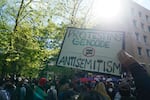
Hundreds of people attend a pro-Palestinian protest on Portland State University's campus on April 29, 2024. A protester is holding a placard that reads "Protesting genocide doesn't equate to antisemitism."
Kristyna Wentz-Graff / OPB
Students are getting involved in this issue for several reasons, he said. Some with Jewish, Muslim and Arab backgrounds may have deeply personal ties to the region through family or religious connections. For others, they’re sympathetic and want to voice their support.
“The university has a role in providing some sort of framework for students,” Meir said, “especially in terms of educating student activism about topics as sensitive as this one.”
Meir said it’s sometimes the case that pro-Palestinian activism crosses the line into antisemitism, though he suspects many activists don’t realize they’re drawing on antisemitic tropes or that certain phrases or words might be offensive. But he said it’s the role of the university to step in and educate when that happens.
He called out the PSU administration and President Cudd in particular for not condemning antisemitism among Palestine solidarity activists more forcefully — saying she’s had “many opportunities to do so but has not taken them” and arguing that inaction has contributed to an atmosphere of intimidation.
“I think it’s fair to say a lot of people on campus are feeling quite disappointed,” he said Wednesday. “And I’m not just talking about Jewish students or faculty or staff here, you know. I’m talking about other people that I’ve been talking with who are concerned that the university has been much too permissive, as far as this kind of hateful rhetoric.”
Cudd sent a letter to the PSU community Friday saying she knows there’s still a lot of hurt and anger surrounding the protests, the ongoing violence in Gaza, and the “disturbing scenes that have played out in our midst.”
“I know many of you will continue to raise your voice in protest, and I am in full support of your right to do so,” she wrote. “At the same time, I expect that protesters will not intimidate and harass students or other members of our community.”
Pleas against the protests
One student, who asked to be called Kendall for “protection from peers,” recently sent an anonymous letter to Cudd and PSU faculty detailing her personal connection to the war and how it has affected her here in Oregon.
“In October, my cousin-in-law was shot in the neck by a Hamas terrorist in Israel and is still recovering. In January, my partner’s childhood best friend … was blown up and killed by a Hamas bomb at only 23 years old,” Kendall wrote in the letter. “The pain of this war rings heavy through my home. Not a day has gone by where I have not wished it would end.
“I want the war to stop,” she continued. “I want the hostages freed, and innocent Palestinian and Israeli people to have full, beautiful, peaceful futures.”
Kendall said she’s been upset by images and slogans she’s seen this week at the library, including “Genocide the Rich,” “Blow up banks,” “Globalize the Intifada,” and “AZAB (All Zionists Are Bastards).”
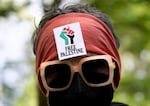
An attendee at a pro-Palestinian protest, with a sign reading "Free Palestine" on their head, on Portland State University's campus on April 29, 2024, in Portland, Ore.
Kristyna Wentz-Graff / OPB
Before police entered the library Thursday to clear the protesters, Kendall shared her perception of the university’s response, saying she’s felt disheartened and demoralized.
“What a strange experience,” she wrote, “to sit at home for 2 days while my campus is closed because people who hate me have demands that are being negotiated with and whose hatred has so far been met with no tangible repercussions.”
Kendall described herself as a first-generation student from a low-income family, raised in a single-parent household “held together at the seams by my dad’s social security disability checks.” She had plans to continue at Portland State next year in a graduate program in social work. However, that’s changed, she said, especially since the university’s School of Social Work posted on Instagram, voicing support for a free Palestine.
“I do not want to hide my Star of David jewelry, my heritage, or my religion in the year 2024,” she wrote in her letter to the PSU president and faculty. “I do not want to have to avoid campus. But my safety is contingent on all of these factors as long as these ‘protests’ are allowed and embraced as ‘passionate free speech.’”
Feeling ‘utterly betrayed on both sides’
Another PSU student spoke to OPB anonymously about her experiences as a mixed Indigenous student who is both Jewish and Native American.
Speaking about the “progressive, leftist culture and social and political environment of PSU,” her voice broke, saying she feels “completely and utterly betrayed on both sides.”
She said Oct. 7 was the beginning of a ramping up of issues on campus, largely in the classrooms. She said some of her professors started promoting rallies and protests in class, some sharing what she described as “completely ahistorical resources,” which has made her feel isolated.
“Professors are people that you learn from, people that you trust..,” she said. But in this case, she argued they were “rewriting” history and making antisemitic and blatantly racist claims. They were “telling me who a Jew is and telling me what Indigeneity is,” she continued, speaking through tears again. “And it just was so horrible and so awful.”
For months, she’s dropped or missed classes to avoid protests. She often feels unsafe on campus and upset by things she sees on social media. She’s stayed home during this week’s protests, experiencing heightened stress, anxiety and panic attacks. She said she’s lost a lot of friends.
“It’s literally impossible to be a normal student and get all of my classwork done or feel like I can pay attention in class,” she said.
“It’s literally midterms. Like, our education is being toyed with,” she continued, “and we’re sitting, afraid, in our homes while our classmates and our fucking professors are out screaming horrible things, horrible antisemitic things, and trashing our school buildings.”
When asked what she thinks should be done moving forward, the student said there’s a part of her that feels so hurt, she thinks: “How can you possibly make up for anything that has happened?”
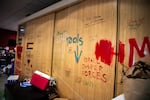
Walls are covered in spray-painted messages and screeds at Portland State University’s Branford Price Millar Library Thursday morning, May 2, 2024.
Courtesy of Mark Graves/The Oregonian
But a good starting point, she said, would be for the university to acknowledge there has been hate speech and antisemitism on campus and in classrooms — to call it out and condemn it.
She also wants required diversity, equity and inclusion training for the faculty and staff to include identifying antisemitism. And she wants more support for students who’ve been affected. She said other student groups haven’t partnered with Jewish student organizations she’s a part of when they’ve reached out this year, and that she hasn’t been welcomed or invited to some student spaces.
“There’s this whole dynamic of like … [to be] a ‘good Jewish student’ — somebody who’s allowed to socialize with everyone else at school — is somebody who completely disowns their own ancestry and disowns their own culture,” she said. “You have to have no connection to Israel at all if you want to be accepted as a ‘good Jew’ at school.
“So, it’s been incredibly, incredibly isolating and incredibly difficult to be a normal college student who is able to just feel safe, feel welcomed and feel like they can socialize and feel like they can have dialogue and discussions and talk with other students,” she said. “It just simply does not exist.”
Related: Portland State University protests: What to know about the activity on campus
Involvement and repercussions
Andy Gitelson is the interim executive director for Oregon Hillel and a campus support director with Hillel International. The international group describes itself on its website as “the largest Jewish campus organization in the world, serving students at 850 colleges and universities across the globe.”
In his role, Gitelson works with Jewish student and community groups at both Oregon State University in Corvallis and the University of Oregon in Eugene.
“All students have the right to protest, and all students have the right to free speech, but one of the pieces we’ve worked really hard to try and ensure is that there is no intimidation — that students aren’t being intimidated for their viewpoint,” he said. This, he added, applies whether students support Palestine, Israel or just want to go to class.
Gitelson said one of the biggest challenges, similar to some student sentiments, has been faculty and staff using their classroom space for sharing their political ideologies.
“Students that want to engage in civil disobedience are welcome to do that,” he argued, “but they’re not entitled to, nor should they impact the learning experience of other students. And nor, too, should, their faculty or professors reward participation in politically driven protests and rallies and encampments.”
Gitelson said universities need to follow their own codes of conduct and policies around these issues, including consequences for disruption of learning or destroying property. He clarified that he doesn’t think that inherently means police intervention. Often these policies include things like restrictions to space or financial fines to make up for damages.
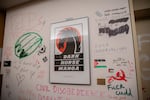
Walls are covered in spray-painted messages, such as "civil disobidence," at PSU's Branford Price Millar Library Thursday morning, May 2, 2024.
Courtesy of Mark Graves/The Oregonian
Regardless of where someone stands on the issue at hand, he says the policies still apply to the students.
“These are not children; they’re young adults,” he said. “They need to be aware that those choices, all choices, have repercussions.”
Gitelson said he’s dealt with heightened aggression for being Jewish, such as at a recent tabling event on a campus where he says someone called his group “genocidal fucks.” He agreed with PSU students who said to be accepted as a Jewish person right now means giving up any connection to Israel.
“I would never ask students to give up a piece of their identity to be in community with me,” he said. “I may not agree with some of those viewpoints that a country is doing or that a political leader is doing — I don’t agree with all the decisions our own country does, right?”
Pro-Palestine protesters — as seen on some of the PSU signs this week — often argue that critiquing Israel or protesting genocide does not equate to antisemitism. Similarly, folks like Gitelson have said being Jewish or having ties to Israel does not equate to supporting the policies of Israeli Prime Minister Benjamin Netanyahu.
“The Jewish students that I know on our campuses all want a cease-fire, too,” he said. “They all want to see the hostages be returned home. They want to see the violence in Gaza end. They want to see Israeli reservists return to their homes. They want to see Gaza rebuild and heal; they want to see Israel heal and rebuild.”
